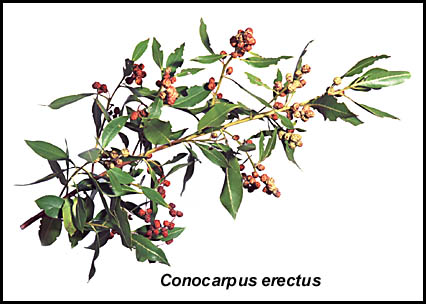Buttonwood
Conocarpus erectus
Family: Combretaceae
Natural History

Buttonwood is a shrubby mangrove tree that has a picturesque appearance when exposed to constant seashore winds creating an attractive addition to the beach landscape. Its name refers to the red-brown, cone-like fruits. Buttonwood is usually low branching and multi-trunked. It is native to Florida's mangrove forest ecosystem.
As a tropical tree, buttonwood does not grow north of Florida's Cape Canaveral and Cedar Key. From this northern limit, buttonwood growth in the brackish tidal lagoons and bays ranges to the Florida Keys and Bermuda, the West Indies, Central and South America, and western Africa. Buttonwood is highly tolerant of full sun, sandy soils, salty conditions, and the soils of shaded and moist oak hammocks. They are found on the edges of salt flats, rocklands of the Florida Keys, borders of fresh and brackish marshes, edges of hammocks, sometimes on spoil and other disturbed areas in South Florida.
Buttonwood is often used for seaside landscaping. The wood was used for firewood, cabinets, and making charcoal. It is very strong wood and ideal for smoking meats and fish because it burns slowly and releases generous quantities of heat. Buttonwood is tough and long lasting in the landscape. It can withstand the rigors of urban settings and makes a durable street or parking lot tree.
